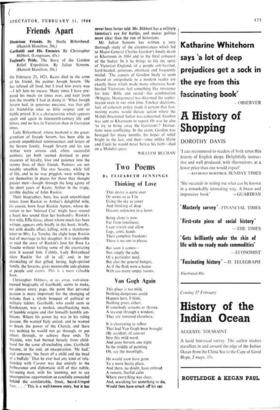Friends Apart
illustrious Friends. By Sheila Birkenhead. (Hamish Hamilton, 50s.) Garibaldi and His Enemies. By Christopher Hibbert. (Longmans, 45s.)
ON February 23, 1821, Keats died in the arms of his friend, the painter Joseph Severn. 'He has refused all food, but I tried him every way —I left him no excuse. Many times I have pre- pared his meals six times over, and kept from him the trouble I had in doing it.' What Joseph Severn had, in generous measure, was that gift for friendship once so little suspect and so highly prized. It is a characteristic which appears again and again in nineteenth-century life and letters, and no less in Victorian than in Georgian times.
Lady Birkenhead, whose husband is the great- grandson of Joseph Severn, has been able to consult unpublished reminiscences and letters of the Severn family. Joseph Severn and his son Arthur were serious and, often, successful painters; yet both seemed destined to pour treasures of loyalty, love and patience into the stormy lives of their friends. Painters are not notably unselfish. The two Severns, while full of life, and in no way priggish, were willing to cut themselves in pieces for those they thought greater men—Joseph through the long agony of the short years of Keats; Arthur in the tragic, terrible decline of John Ruskin.
Their biographer, here, has used unpublished letters from Ruskin to Arthur's delightful wife, his cousin, born Joan Ruskin Agnew. whose de- votion to her 'beloved Coz' might have soured a heart less sound than her husband's. Ruskin's first wife, Effie Gray, about whom much has been written, appears only briefly in this book; briefly, but with deadly effect, killing, with a slanderous letter to Mrs. La Touche, the slight hope Ruskin had of marriage to her daughter. It is impossible to read the story of Ruskin's love for Rose La Touche without feeling some of the excoriating pain it caused him. Calmly, Lady Birkenhead takes Ruskin 'for all in all,' and, in her chronicling of that gifted, loving, high-spirited family, the Severns, gives memorable side-glances at people and events. This is a most valuable book.
Christopher Hibbert, in ills crisp, well-docu- mented biography of Garibaldi, seems to make, on almost every page, the point that personal passion is more important for the changing of nations than a whole bouquet of political or military talents. Garibaldi, who could seem so flamboyant, was a modest, unselfseeking man, of humble origins and (for himself) humble am- bitions. Where his power lay was in his ruling passion. He wanted Italy united, and he wanted to break the power of the Church, and there was nothing he would not go through. or put others through, to achieve these ends. To Mazzini, who had burned fiercely from child- hood for the same all-excluding aims, Garibaldi became, in the end, an exasperation. He had,' said someone, 'the heart of a child and the head of a buffalo.' That he ever had any kind of rela- tionship with Cavour was due entirely to the forbearance and diplomatic skill of that subtle, far-seeing man, with his 'cunning, not to say unscrupulous opportunism so carefully concealed behind the comfortable, frank, beard-fringed face. . . This is a well-known story, but it has never been better told. Mr. Hibbert has a military historian's eye for battles, and makes politics more clear than the run of historians.
Mr. Julian Symons has written a very thorough study of the circumstances which led to Major-General Charles Gordon's lonely death at Khartoum in 1884 and to the final conquest of the Sudan. In it he brings to life the spirit of Victorian England, of a people soft-hearted, hard-headed, generous, obstinate and frequently misled. 'The aspects of Gordon likely to seem absurd or antipathetic to a modern reader are exactly those which made many otherwise hard- headed Victorians feel something like reverence for him.' Bible and sword—this combination (Wingate, Montgomery) has disarmed the sophis- ticated even in our own time. Unclear decisions, lack of coherent policy made it certain that fast- moving events would dictate action where the Mandi-threatened Sudan was concerned. Gordon was sent to Khartoum to report. Or was he also 'to try to bring away the Garrisons'? Instruc- tions were conflicting. In the event, Gordon was besieged for many months, his hopes of relief bright to the last, and then—since unlike Slatin and Cuzzi he would never betray his faith—died on a Mandist spear.
WILLIAM BUCHAN


































 Previous page
Previous page